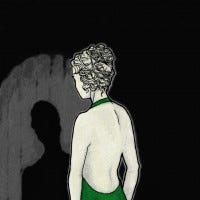Writer and designer Emily Short looks at storytelling techniques in Terry Cavanagh's unique indie games Don't Look Back and Judith to uncover "the methods by which a masterpiece will one day be written."

[Writer and designer Emily Short looks at storytelling techniques in Terry Cavanagh's unique indie games Don't Look Back and Judith to uncover "the methods by which a masterpiece will one day be written."] Terry Cavanagh has written a game, Don't Look Back, recapitulating the journey of Orpheus to the underworld to retrieve his dead wife, Eurydice. You know how it goes, I hope. Orpheus is the greatest musician in the world, but his gift does not protect him from misfortune. His beautiful young bride steps on a viper shortly after their wedding. (According to Ovid this is clumsiness; Vergil has her fleeing a would-be rapist.) Distraught, Orpheus makes the journey to the underworld, lulling the guard dog Cerberus to sleep, entrancing all the ghosts, until he finds Hades and his wife Persephone. Orpheus sings a song about how terribly he misses Eurydice, the gist of which according to Ovid goes a little like this: "I'm asking, please -- renegotiate the terms for Eurydice. Everything in life is mortgaged to you. Whether we put you off for fifteen years or thirty, you always foreclose in the end, humanity's only permanent bank. This girl you can repossess as well, as soon as she's aged into a pensioner. We're asking only to borrow her on a short-term loan with favorable rates." (I have exaggerated Ovid's financial terminology less than you think.) Persephone, moved, consents to send Eurydice back, on one condition: Orpheus must not look back at her until they reach the world above. So he begins the terrible climb, and finally he comes to where he can see the upper world -- green land and sunlight over the lip of the cliff -- and the anticipation of arrival and the bottled apprehension is so great that he cannot help himself. He turns. And in that moment Eurydice dissolves into shadow and is lost for good. This is the story that Terry Cavanagh tells as a spare, difficult platformer. Orpheus doesn't sing in this version. He shoots a gun, and jumps over snakes, and dodges hell's falling stalactites. Spare music accompanies his journey. When he reaches Hades, he gets a follower, and he must not turn back toward her, a problem that complicates the journey. And then -- well, I won't give away the end. What makes Cavanagh's rendition is that it is hard. Other media can show us the beauty of Orpheus' song, as in many operas written on the topic; or represent the innocence and sorrow of the lost Eurydice, as in sculpture and painting from the 5th c. BC to the 19th AD; or capture the internal torment of the principals, as many novels have. Don't Look Back takes its strength from a game's power to frustrate. Each screen of the game, if the player loses, he has only to restart the screen he was on, not replay from the beginning, so that frustration is contained and the game always feels as though it must be winnable. Nonetheless, each individual screen can be quite hard, so that it seems possible one might have to give up after all. And so the game produces (at least for mediocre platform players such as myself) this desire to give up, balanced with the desire to see the rest, and a sense of having come too far to stop. So, like Orpheus, we are committed. Effort, aggravation, persistence, the continued play all the while knowing the cause is probably lost... it is well-turned, and it conveys the futility of grief in a way unique to this medium. Judith (written by Cavanagh with Stephen Lavelle) goes as far in the opposite direction as is possible to go. There is no action, no difficulty, no puzzles to speak of; all that the player has to do is navigate through an abandoned castle, each time entering whatever doors happen to be unlocked when he reaches them. This action causes new plot to be dispensed. There is some innovation in the use of viewpoint, since the player transitions back and forth, playing now a man in the modern day and now a woman some decades (or perhaps centuries) earlier. But essentially the progress of the game comes from clicking, in sequence, the commands that appear on the screen as you move around.  The audience responses to this are predictably divided: "This is awesome!" / "But it isn't a game!" / "It doesn't have to be a game! It's something else! It is Art!" / "But it isn't fun! And I didn't think it was all that artistic!" And so on. I sort of agree with all of these statements. Judith is, by many metrics, not a game: there is no clear goal for the player other than finishing, no winning or losing, no challenge, no choice. There is only a story that moves forward when the player follows a predetermined path of action. And the leads are sometimes very blatant, or very dull. By the fourth or fifth time one is wandering down a hallway, one is tired of clicking on every door to find the single one that is unlocked and has More Plot behind it. Still, the effect (as various people have pointed out) can still be compelling, because the player is afraid of what will happen to the characters, but the only way to see the end of the story is to place them at risk; so, for his own ends, he risks them. Instead of watching a horror movie and shouting DO NOT GO IN THE BASEMENT, we're playing the horror movie and clicking on the basement door ourselves. At the same time, because the protagonists are characterized, because they are individual people whose viewpoints we experience alternately, they stand apart from the player: we are risking them, not ourselves or our avatars, when we choose to walk/have them walk into the darkness. And that's what makes "Judith" feel different from a horror-themed first person shooter. The act of playing through awakens a moral tension in the player. The idea of using player complicity this way is not new to me, but it's not something I have encountered very much in practice outside the world of interactive fiction, where it was perhaps most emphatically introduced by Adam Cadre in "Photopia". So it is not entirely a surprise to read that Cavanagh is a big Cadre fan. In any case, Judith is, I think, not a great piece of art. The dialogue is dry, the characters stilted, much of the plot predictable. I found it compelling but also exasperating. But it demonstrates, again, and perhaps to a new audience, one of the ways in which games-as-medium can transcend games-as-genre. In this respect, both Judith and Don't Look Back are successful. Both push at the boundaries of what interactivity can do for or to a story while still genuinely having a substantial narrative arc. This is a different style of art game than Jason Rohrer's more procedural approach to developing a theme: "Passage may have a point, but it doesn't quite have a story. I find myself thinking, as I do about many indie productions these days: this is not a masterpiece, but it shows the methods by which a masterpiece will one day be written. [Emily Short is an interactive fiction author and part of the team behind Inform 7, a language for IF creation. She also maintains a blog on interactive fiction and related topics. She can be reached at emshort AT mindspring DOT com.]
The audience responses to this are predictably divided: "This is awesome!" / "But it isn't a game!" / "It doesn't have to be a game! It's something else! It is Art!" / "But it isn't fun! And I didn't think it was all that artistic!" And so on. I sort of agree with all of these statements. Judith is, by many metrics, not a game: there is no clear goal for the player other than finishing, no winning or losing, no challenge, no choice. There is only a story that moves forward when the player follows a predetermined path of action. And the leads are sometimes very blatant, or very dull. By the fourth or fifth time one is wandering down a hallway, one is tired of clicking on every door to find the single one that is unlocked and has More Plot behind it. Still, the effect (as various people have pointed out) can still be compelling, because the player is afraid of what will happen to the characters, but the only way to see the end of the story is to place them at risk; so, for his own ends, he risks them. Instead of watching a horror movie and shouting DO NOT GO IN THE BASEMENT, we're playing the horror movie and clicking on the basement door ourselves. At the same time, because the protagonists are characterized, because they are individual people whose viewpoints we experience alternately, they stand apart from the player: we are risking them, not ourselves or our avatars, when we choose to walk/have them walk into the darkness. And that's what makes "Judith" feel different from a horror-themed first person shooter. The act of playing through awakens a moral tension in the player. The idea of using player complicity this way is not new to me, but it's not something I have encountered very much in practice outside the world of interactive fiction, where it was perhaps most emphatically introduced by Adam Cadre in "Photopia". So it is not entirely a surprise to read that Cavanagh is a big Cadre fan. In any case, Judith is, I think, not a great piece of art. The dialogue is dry, the characters stilted, much of the plot predictable. I found it compelling but also exasperating. But it demonstrates, again, and perhaps to a new audience, one of the ways in which games-as-medium can transcend games-as-genre. In this respect, both Judith and Don't Look Back are successful. Both push at the boundaries of what interactivity can do for or to a story while still genuinely having a substantial narrative arc. This is a different style of art game than Jason Rohrer's more procedural approach to developing a theme: "Passage may have a point, but it doesn't quite have a story. I find myself thinking, as I do about many indie productions these days: this is not a masterpiece, but it shows the methods by which a masterpiece will one day be written. [Emily Short is an interactive fiction author and part of the team behind Inform 7, a language for IF creation. She also maintains a blog on interactive fiction and related topics. She can be reached at emshort AT mindspring DOT com.]
About the Author(s)
You May Also Like








